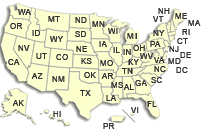South Atlantic Water Science Center
South Atlantic Water Science Center
![]()
Full Title
Groundwater Level and Conductance Monitoring Network at Marine Corps Base, Camp Lejeune
Location
![]() Camp Lejeune in Onslow County
Camp Lejeune in Onslow County
Cooperating Agencies
Marine Corps Base Camp Lejeune Environmental Management
Project Chief
Kristen B McSwain
kmcswain@usgs.gov
Period of Project
2007-present
Team Members
Douglas G. Smith
Science Topic:
Groundwater resources
Support of Federal and State Programs
USGS Water Science Centers are located in each state.

This project was completed in 2012. These pages are for historical purposes only.
Groundwater-level monitoring equipment at Camp Lejeune.
Background
The demand for future drinking-water supplies is one of the major issues facing the Onslow County area. Since Camp Lejeune was opened in the early 1940’s, drinking water has been supplied from wells that tap sands and limestones present in the surficial and Castle Hayne aquifers. Ultimately, the intrusion of saltwater into the aquifer systems from the nearby New River Estuary or upward from deeper brackish aquifers will likely reduce the sustainability of the water resources.
Objectives
The objective of this study is to construct and maintain a groundwater level and conductance-monitoring network for Camp Lejeune. The project data will provide a basis for measuring short- and long-term fluctuations in aquifer water levels and conductance as a result of the groundwater withdrawal practices of neighboring large-volume water suppliers. Water level and conductance data can be used to establish critical levels for groundwater conditions.
Approach
A network of 19 wells at 8 sites that tap the surficial, Castle Hayne, Peedee, and Black Creek aquifers were instrumented with real-time monitoring equipment. Activities include data collection of:
Continuous conductance and temperature data are collected from a single point within the screen of each well.